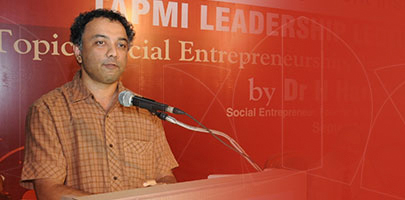Leadership Lecture by Dr.Harish Hande

Dr.Harish Hande, Founder and Managing Director of SELCO India, and winner of the prestigious Ramon Magsaysay Award 2011 for his pioneering work in taking solar energy to the poor through a sustainable business model, delivered a lecture on ‘Social Entrepreneurship, Sustainable Enegry and the Youth’ to the Engineering and MBA students of Manipal. This lecture, organized by T. A. Pai Management Institute (TAPMI), Manipal is the seventh in the Silver Jubilee Leadership Lecture Series. This initiative is to nurture future leaders by providing a platform to the young business minds to interact with the great leaders of today.
Dr. A.S. Vasudeva Rao (Director, TAPMI), Dr.H.S. Ballal (Pro-chancellor of Manipal University), Dr. Shantaram (Trustee, Member of Governing Council) and Professor Chowdari Prasad (Dean of Planning and Development) were present on the dais. The audience consisted of management students and faculty of TAPMI and Manipal University.
Dr. Vasudev Rao welcomed the gathering. Dr. Shantaram referred Dr. Hande as a proud son of coastal Karnataka emphasizing on his immense contribution in the field of Solar Energy. Dr. Shantaram stressed on the fact that Dr. Hande being a very young Social Entrepreneur, has fully devoted himself to the cause of providing affordable sources of renewable energy to the rural areas. Prof. Chowdai Prasad introduced the Chief Guest.
Dr. Harish Hande started his address with humour calling himself a classical product of Subsidy. He opposed the view of subsidies being perceived as bad in several MBA institutes and the society by giving examples of Vietnam. One should choose the holistic approach of choosing a job based not only on the monetary gain but based on the concern for family, youth and society. He mentioned about how one treats one’s ecosystem and emphasised on the daily acts of judging people more on terms of their profile, job and social status rather than emphasizing on them being treated as equal individuals. He focussed on the Indian education system as putting students into a Cocoon, where the overall growth of the individual is hampered. He views India as a paradox of an overdeveloped and an underdeveloped country and suggested that India needs a paradigm shift in various business models.
Dr. Hande brought into light that there is a difference between needs and wants. He mentioned that we have not created models on the needs of the poor keeping into mind the variety in cash flows and suggested that we should focus more on creating models based on innovation which other developing countries like Africa can follow. India should become leaders of 4 billion people rather than taxing the classic model of sustainability by focussing more on the markets of classic business models of McDonalds and Walmart.
Stating that needs vary based on geographic location like in various states in India, he explained that they cannot be explained if we choose such classical business models giving an example of the 5 trillion dollar case of the Hindustan Lever Ltd.
He questioned the true meaning of Sustainable Development in India in reference to Salt workers of Kutch and Coal miners of India. He said that we need a decentralised approach of energy and mentioned about the sensitivity of breaking the barriers between banks and people including the poor.
Solar loan has made the poor financially bankable. He mentioned that the rich India are hiding behind the poor and living on the subsidies of the poor, which can be turned around at the advantage of the rich and see how it can be utilized in creating sustainable energy and development. According to him, the poor cannot be faulted for contributing to environmental threats because the society as a whole is responsible for not providing them with the optimum solutions.
He concluded by showing his disappointment with the youth of today by holding them responsible for the future unsustainability of the country. According to him, the best form of protests is to create solutions today for which the youth are being educated and not make excuses. Hence, he put it as a challenge to the youth of today to make a difference by providing a solution and not by following a solution set by others.

